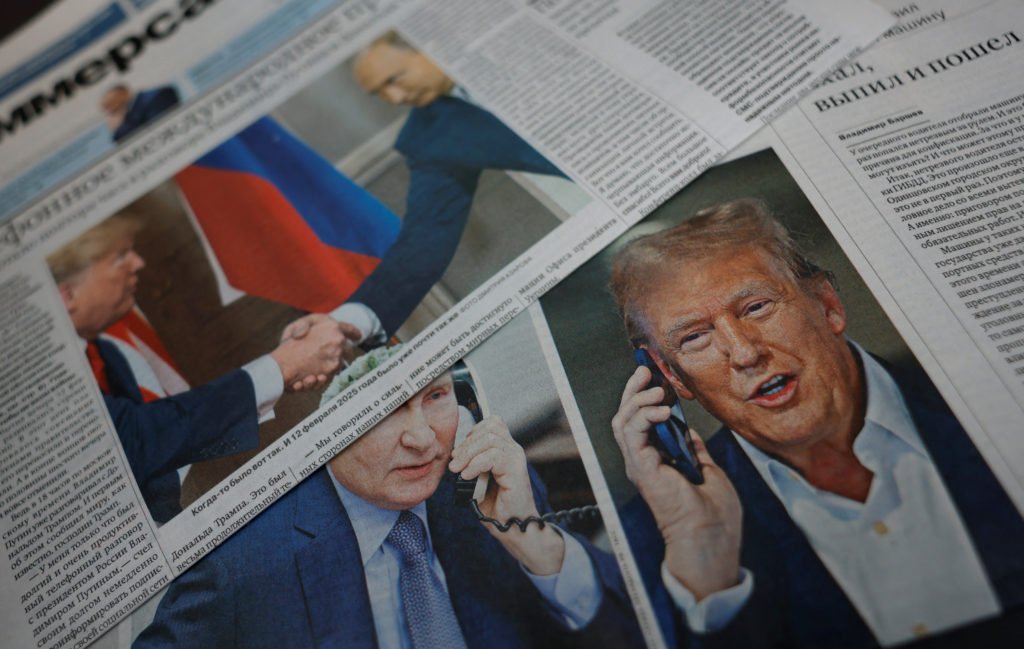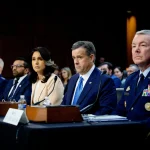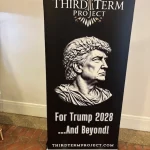
Unpacking Trump’s Strategy: A Deep Dive into Political Maneuvering
Posted in :
Trump Foreign Policy Strategy: Putin Call, Ukraine, and NATO Fallout
Delving into the nuances of Donald Trump’s political strategies, specifically focusing on his dealings with key figures like Vladimir Putin and the implications for Ukraine and NATO. We aim to uncover the layers behind Trump’s foreign policy approach, examining how his understanding of power dynamics shapes international relations.
In an ever-changing political landscape, few figures polarize opinions as much as Donald Trump. His recent phone call with Vladimir Putin offers a glimpse into his unique method of engagement and negotiation. As we explore the intricacies of domestic and international implications, one has to ask: Is Trump an astute strategist or merely playing a dangerous game of politics?
The Trump-Putin Connection: Analyzing the Dynamics
Important Context of the Trump-Putin Phone Call
The phone call between Donald Trump and Vladimir Putin aimed to broker a ceasefire in the ongoing Ukraine conflict. However, its effectiveness remains a topic of heated debate. Many analysts argue that the call was more symbolic than substantive. It raised questions about the true intentions of both leaders. Were they genuinely seeking peace, or was this just a public relations move?
In the backdrop of this call, it’s crucial to understand Trump’s approach to foreign relations. His style often involves pushing for engagement, even when the other party seems resistant. This tendency can be likened to a game of chess, where each move is calculated, yet sometimes misinterpreted. Trump’s interactions with Putin exemplify this dynamic. The call was not just about diplomacy; it was also a reflection of Trump’s broader strategy in international affairs.
Reactions from Political Analysts and Public Opinion
Responses from political analysts have varied widely. Some view the call as a missed opportunity for genuine dialogue. Others suggest that it reflects a deeper issue within U.S. foreign policy. The notion of being ‘played’ or complicit in a larger strategy has emerged as a significant theme. As one analyst noted,
“If Putin is always able to take advantage, maybe Trump is playing a different game altogether.”
Public opinion also plays a crucial role in shaping the narrative around this call. Many Americans are skeptical of Trump’s dealings with Putin. They question whether these interactions serve national interests or merely bolster Trump’s image. The divide in public sentiment highlights the complexities of international relations today. How can leaders navigate these waters without losing the trust of their constituents?
The Notion of Being ‘Played’ or Complicit in Strategy
The idea of being ‘played’ in international politics is not new. It suggests that one leader may be outmaneuvering another. In the case of Trump and Putin, this notion raises critical questions. Is Trump genuinely trying to forge a partnership, or is he unwittingly advancing Putin’s agenda? This ambiguity complicates the understanding of U.S.-Russia relations.
Some experts argue that Trump’s approach is rooted in a Cold War mentality. This perspective divides the world into spheres of influence, which can be detrimental to American interests. The reluctance to appoint an American head to NATO, for instance, signals a shift in traditional alliances. Such moves can alter the dynamics of international relations, leading to unforeseen consequences.
Historical Context of Trump’s Approach to Foreign Relations
Trump’s historical approach to foreign relations has often been characterized by a transactional mindset. He views international engagements through the lens of deals and negotiations. This perspective can lead to misunderstandings, particularly when dealing with leaders like Putin, who may have different objectives.
Moreover, the geopolitical landscape has shifted significantly. The rise of nationalism and populism, both in the U.S. and abroad, has influenced how leaders interact. Trump’s policies have inadvertently contributed to these shifts, as seen in Canada, where political dynamics are evolving. Recent polls indicate that the Liberal Party, led by Mark Carney, is gaining ground against the Conservatives. This change reflects broader trends influenced by Trump’s approach.
The discussion surrounding the Trump-Putin phone call reveals much about the characterizations of Trump’s strategic approach. As analysts continue to dissect the implications of this call, the broader context of U.S. foreign policy remains at the forefront. The effectiveness of such engagements will likely be scrutinized in the coming years, particularly as the political landscape evolves.
Implications for Ukraine: A Game of Power
The recent discussions surrounding Donald Trump’s proposals have raised significant questions about the future of American support for Ukraine. As tensions continue to simmer in Eastern Europe, the implications of these proposals are profound. What does it mean for Ukraine? And how will it affect the balance of power in the region?
Impact of Trump’s Proposal on American Support for Ukraine
Trump’s approach to foreign policy has often been characterized by a transactional mindset. His recent statements regarding Ukraine suggest a potential shift in how the U.S. engages with the country. For many, this raises a red flag. Will America’s commitment to Ukraine waver? The fear is that a less supportive stance could embolden adversaries.
- Trump’s rhetoric hints at a possible reduction in military aid.
- Concerns grow about the future of political alliances with NATO.
- Ukraine’s sovereignty may be jeopardized if U.S. support diminishes.
In a recent conversation, a senior writer from The Atlantic noted, “The goal of the conversation wasn’t peace, but perhaps a shift in support for Ukraine.” This statement encapsulates the anxiety surrounding Trump’s foreign policy. If the U.S. were to pivot away from Ukraine, what would that mean for the ongoing conflict with Russia?
Reactions from Ukraine Following the Phone Call
Ukraine’s response to Trump’s phone call has been telling. Following the conversation, immediate military actions were observed. Ukrainian forces launched strikes on Russian infrastructure, signaling a clear message: they will not back down. This reaction underscores the urgency of the situation.
Ukrainian officials expressed concern over the implications of Trump’s proposals. They worry that a change in American support could lead to a more aggressive Russian stance. The stakes are high. The balance of power in Eastern Europe hangs in the balance.
The Balance of Power in Eastern Europe
The geopolitical landscape in Eastern Europe is fragile. Trump’s approach could potentially alter this balance. Historically, the U.S. has played a crucial role in maintaining stability in the region. However, if support for Ukraine wanes, what happens next?
- Russia may feel emboldened to expand its influence.
- NATO’s credibility could be undermined.
- Other Eastern European nations may reconsider their alliances.
As David, the Atlantic writer, pointed out, Trump’s understanding of international relations seems rooted in a bygone era. His Cold War mentality divides the world into spheres of influence. This perspective may not align with the current complexities of global politics.
Moreover, the implications extend beyond Ukraine. The potential collapse of standardized military programs, like the F-35 fighter initiative, could have far-reaching consequences. If the U.S. fails to support its allies, it risks losing its influence in the region.
Immediate Military Actions Post Call
In the wake of Trump’s phone call, Ukraine’s military actions were swift. They demonstrated a readiness to defend their territory. The statistics on U.S. aid to Ukraine before and after Trump’s presidency reveal a stark contrast. Under previous administrations, support was robust. However, uncertainty now clouds the future.
As tensions rise, the question remains: how will the U.S. navigate this complex landscape? The need for a coherent strategy is evident. Without it, the consequences could be dire.
In summary, the implications of Trump’s proposals for Ukraine are significant. The potential shift in American support raises alarms about the future of Eastern Europe. With ongoing conflict and a delicate balance of power, the stakes have never been higher. Ukraine’s immediate reactions reflect the urgency of the situation. As the world watches, the next steps will be critical.
NATO and Its Future: Trump’s Approach Examined
Donald Trump’s presidency marked a significant turning point for NATO. His approach to international relations has raised questions about the future of this long-standing alliance. How do his decisions impact NATO’s cohesion? What concerns do member nations have regarding U.S. leadership? And how has NATO evolved historically under Trump? These are crucial questions that deserve a closer look.
Impact on NATO’s Cohesion
Trump’s decisions have undeniably shaken the foundation of NATO. His rhetoric often emphasized a transactional view of alliances, suggesting that member nations should pay more for their defense. This stance has led to a sense of unease among allies. Many member nations worry that the U.S. might not fulfill its commitments, especially in times of crisis. The cohesion that NATO has enjoyed for decades seems to be under threat.
In a recent discussion, David, a senior writer at The Atlantic, highlighted how Trump’s negotiation strategies reflect a misunderstanding of international relations. He likened Trump’s approach to a challenge that must be overcome, rather than a partnership built on mutual respect. This perspective can lead to a reevaluation of alliances that have taken decades to build. Are we witnessing a shift in how NATO operates?
Concerns of Member Nations
Member nations have expressed growing concerns about U.S. leadership under Trump. The reluctance to appoint an American head to NATO and the potential collapse of standardized military programs, like the F-35 fighter initiative, have raised eyebrows. Countries that once relied on U.S. support now question whether they can count on their ally in times of need.
- Many European leaders have voiced their worries about Trump’s unpredictability.
- There’s a fear that the U.S. might withdraw its support, leaving member nations vulnerable.
- Some countries are even considering increasing their military spending to compensate for potential U.S. disengagement.
These concerns are not unfounded. The dynamics of NATO have shifted, and many member nations are left wondering about their future security. The alliance, which was once seen as a bulwark against aggression, now faces the possibility of fragmentation.
Historical Perspective on NATO’s Evolution Under Trump
Historically, NATO has been a symbol of unity and collective defense. However, under Trump, the narrative has changed. His administration’s approach has been characterized by a more isolationist stance, reminiscent of a Cold War mentality. David pointed out that this perspective divides the world into spheres of influence, which could compromise American national interests.
Trump’s presidency has also seen a rise in populist sentiments, not just in the U.S. but also in countries like Canada. Recent polls indicate a shift in political dynamics, with the Liberal Party potentially gaining ground against the Conservatives. This evolution raises questions about how Trump’s policies are influencing global nationalism and the stability of international relations.
Moreover, the economic implications of Trump’s protectionist policies cannot be ignored. Tariffs have been described as self-defeating, inflating costs for American consumers and disrupting essential supply chains across North America. This economic landscape directly impacts NATO’s military commitments, as member nations grapple with their own financial constraints.
NATO’s Response to Trump’s Policies
In response to Trump’s policies, NATO has had to adapt. The alliance has emphasized the importance of collective defense while also encouraging member nations to increase their military spending. Statistics show that many countries are indeed stepping up their contributions, albeit reluctantly.
For instance, a recent survey indicated that a majority of NATO members are now prioritizing defense budgets. However, this shift comes with a caveat: the fear of U.S. withdrawal looms large. The question remains: can NATO maintain its unity in the face of such uncertainty?
Trump’s controversial approach to international relations has the potential to reshape NATO’s military strategy and its future. As member nations grapple with concerns about U.S. leadership and the implications of Trump’s policies, the alliance stands at a crossroads. The historical perspective on NATO’s evolution under Trump reveals a complex landscape, where traditional alliances are being tested. The future of NATO may depend on how these nations navigate the challenges posed by shifting political dynamics and economic realities. The need for vigilance and adaptability has never been more critical.
TL;DR: Donald Trump’s political maneuvering, particularly regarding his interactions with Vladimir Putin, highlights the complexities of international diplomacy. Analyzing the ramifications of these actions offers insight into the future of American foreign policy and its implications for global stability.
PutinPhoneCall, PoliticalStrategies, NATOAlliance, InternationalDiplomacy, TrumpPresidency, AmericanForeignPolicy, US-RussiaRelations, DonaldTrump, UkraineConflict
#DonaldTrump, #PutinPhoneCall, #US-RussiaRelations, #AmericanForeignPolicy, #InternationalDiplomacy, #PoliticalStrategies, #UkraineConflict, #NATOAlliance, #TrumpPresidency,##TrumpStrategy, #ForeignPolicy, #PutinCall, #UkraineCrisis, #NATO, #USPolitics, #GlobalStability, #InternationalRelations, #Geopolitics, #TrumpEraDiplomacy

